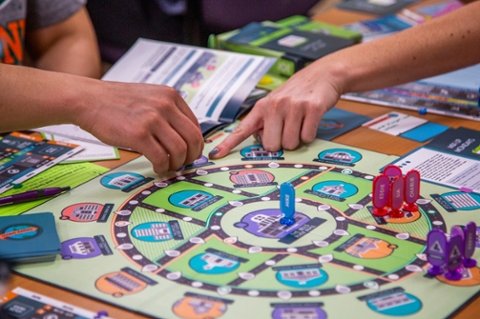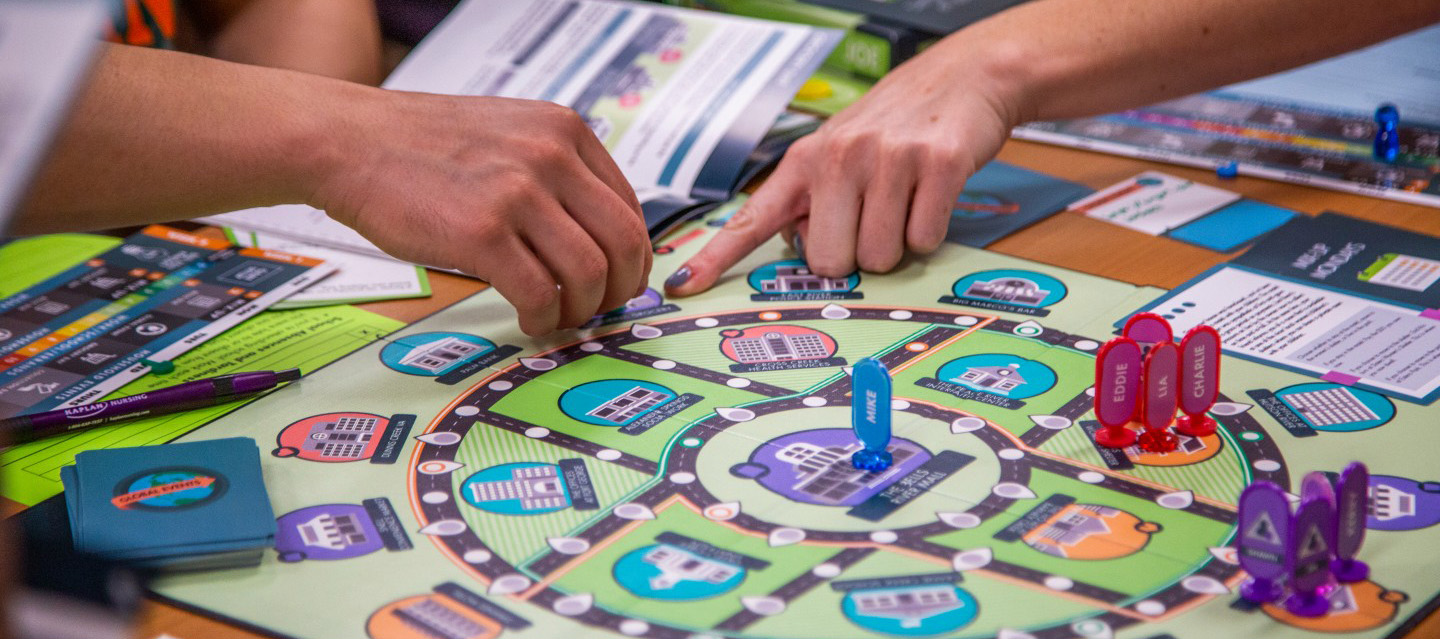What is it?
Play is a powerful learning approach, increasingly so in higher education. Experiential learning strategies such as role play and simulations allow students to take on different personas and interact within diverse learning settings.
With role-play, students assume different characters and act out scenarios, typically without any scripts. These spontaneous scenarios can be situated in reality or ones they are unfamiliar with. Students must use creativity and critical thinking to further get “into” their role. Depending on the context and setup, role play may take days to or even an entire semester to complete.
A simulation is a form of role play, but more structured. In simulations, scenarios are much more complex and more situated in real life. Also, students may assume other characters, or play themselves. There might be more formal “game rules” to follow and fewer decisions to make. Once the scenario is created by the instructor, the simulation typically takes a day to complete.
Role-play and simulations significantly contribute to a student’s learning as they are able to consider multiple perspectives within a challenging environment. Instructors are able to cover more complex course topics in a way that moves students from passive to active learners as they attempt to problem-solve within these next contexts.
How does it work?
To implement approaches such as simulations and role-play, collaborative activities should be structured so that every student is able to fully participate and create meaning (Stevens, 2015). There are generally four stages of implementing role play or simulations in the classroom:
[1] Preparation and explanation of topic by instructor: During this stage, instructors/facilitators will need to focus on a theme, choose and assign roles, create procedures, and gather necessary materials, and start arranging the classroom. This step requires extensive research and design as an instructor must take into account as many aspects of the theme as possible and provide explicit instruction of what is expected of students.
[2] Student preparation for involvement in role-play/simulation: When assigning roles and creating instruction for students, break down the role play/simulation into specific tasks with due dates or time constraints so students remain organized and not overwhelmed. Allow students enough time to research their roles, ask questions, and become comfortable with the scenario. For some students, this might be their first time experiencing this kind of learning, therefore providing students with tips or examples is helpful. Student preparation can also involve instructors giving traditional lectures or facilitating discussions that will give further context and guidance prior to the main role-play or simulation activity.
[3] Actual role-play or simulation activity: Although a degree of independent learning is expected, students will still need to be guided from time to time during these activities. For example, if the role-play runs over several class periods, it is important to remind students of the rules such as staying in their roles or using appropriate communication skills. During actual role play/simulation, instructors will take on the role of observer and interject if necessary. The instructor may act as a moderator if students need to debate on issues, or they may just provide a debrief at the end of gameplay. It is crucial for instructors to make sure that the environment created is one where students (Part L: Role-Plays, Games, and Simulations, 2005):
- Feel safe to explore and take risks without being punished for wrong solutions
- Are allowed to express strong emotions if needed
- Respect one another’s ideas and support individual interpretations
- Feel an established trust between them and the instructor
[4] Debrief and reflection: This is one of the most essential steps of implementing role-play and simulations in the classroom. Students and instructors must process the activity afterward in order to gain further insight into decisions made and behaviors displayed. Based on feedback, instructors may elaborate on certain learning tasks, clarify any misunderstandings, or even make some adjustments for future role plays/simulations. Aside from learning, instructors need to acknowledge the overall emotional involvement students discuss during this debriefing period. Periods of student self-reflection can be integrated throughout gameplay and after each session so that instructors have a better idea of how the activity is going.
Who’s doing it?
Reacting to the Past: Created by a professor at Barnard College, Reacting to the Past is “an active learning pedagogy of role-playing games designed for higher education” (Reacting to the Past, n.d.). Class sessions are run by students who are assigned historical character roles with specific goals they must complete. Students may complete these goals by writing papers, making speeches, or devising public presentations. Students must work in teams to advance their agendas and win the game. Instructors during gameplay advise students and grade work. React to the Past comes with resources/materials such as a student gamebook, instructor's manual, role sheets, companion primary source readings, and other sources to further enrich the activity. This an option instructors can implement or use as a guide if they have time or resource constraints in planning a role play on their own. Reacting to the Past even offers an annual “Faculty Institute” for those who are interested in this strategy for their classroom and want to try it out with expert facilitators.
Language Learning: Role-play is frequently used by ESL instructors in order to help students learn English. Implementing role-play scenarios has proven to improve a student’s communication, learning environment, classroom motivation, and overall speaking skills (Rojas & Villafuerte, 2018). Role-play provides authentic examples that students may experience in the real world, and help them form genuine meaning instead of focusing on just the technical aspects of language. Instructors may implement role-play on a one-on-one basis or as a collaborative group exercise among other ESL students.
Health/Medicine: Role play and simulations are widely used in medical education (Nestel & Tierney, 2007). Such activities are used to practice the necessary skills needed in the field. For one, “standardized patients” involve using trained individuals to portray the role of the patient to allow students to exercise skills such as giving physical exams, giving medical news, or overall patient communication. Then there are simulations that use life-like mannequins so students can work on clinical skills in a regulated, safe environment.
Why is it significant?
Role-play and simulations provide students with opportunities to learn and develop skills in purposeful ways. Instructors can give a traditional lecture in history, or students can experience it for themselves through role play that provides deeper historical context while making it personal. For simulations, students can replicate real scenarios they may encounter either in their chosen discipline or just in life. Instead of relying on traditional assessments, role play/simulations can better introduce key concepts in a more authentic way that promotes better engagement and retention among learners. Overall, role play and simulations challenge students to better understand complex processes or concepts through a creative application, making them come to life.
Here are some additional benefits to introducing role play or simulations in the classroom (Stevens, 2015):
- increased interpersonal communication skills
- develop critical reading skills of textual documents as additional sources
- promote research skills on particular themes or topics
- teaches empathy and how different backgrounds (race, religion, socio-economic, etc.) can shape one’s experience.
- serves as an “ice-breaker” among students
- promotes independent problem-solving for deepened learning
- encourage creative expression not normally experienced in a traditional classroom setting
- Help instructors better evaluate how students make decisions under pressure or collaborate with others
What are the challenges?
Time: A substantial amount of time and commitment is necessary for the planning, execution, and assessment of role-playing and simulations in the classroom.
Setup: Depending on the physical elements of the role-play or simulation, classroom setup can be difficult, especially if working in a space with certain constraints. Also, setup can be challenging if taking into consideration accessibility issues for students or instructors.
Not ideal for every student: If a student struggles with participation or speaking up in class, role play and simulations could generate anxiety that might hinder their overall performance in class.
Adjustment period: If students are new to these kinds of activities, they will need time to adjust to acquire the necessary skills to participate. If not, they can become distracted from the learning process.
Where is it going?
Online role play and simulations: Institutions are encouraging instructors to create role-play and simulations for online learning. Project EnROLE was a two-year project funded by the Australian Learning and Teaching Council (ALTC) to encourage uptake of online role-play (Wills et al., 2009).The project created a community of practice at the university, state, and national levels to better recognize teachers who were already using role play, and to encourage new teachers to start. The project resulted in an extended network of educators and local partnerships, an increase in online role-play opportunities for students, and a recommended guide for future implementations. Universities like Harvard and the University of Colorado Boulder are offering online simulation models in areas such as business or the sciences.
Virtual reality: Using virtual reality (VR) simulations can optimize elements of learning for even deeper participation and reflective practice among students. In a 2012 study conducted at the University of Michigan, a pilot was done in a senior-level nursing course using VR simulation (Aebersold et al., 2012). Using VR to practice patient communications and emergency intervention skills, the study found a significant improvement in student performance.
What are the implications for teaching and learning?
Facilitate Success: Role play and simulations give students opportunities to reflect on learning in a way that makes tacit knowledge much more explicit and engaging. What could be perceived as complex or ambiguous concepts can become much more real once a student assumes a role and is able to apply theory to actual practice. Ironically, once placed in an activity that has clear rules and assigned roles, students are then free to focus on achieving learning goals in a much more creative manner without worrying about failure.
Scaffolding/Coaching: In order to move students to greater independence in their learning, instructors should consider scaffolding assignments and course materials to better guide students. Role-play and simulations are unique techniques instructors can use to gradually increase complexity in their courses by creating scenarios that align with course objectives, build time for students to reflect on learning and model certain processes, and have students overall build agency within their discipline or interests.
Assessments as learning: By taking on the role of another person, role play and simulations lead to more reflection and awareness of learning. Students can use such activities to monitor their own progress and make adjustments when needed for further understanding. Along with proper guidance and feedback, students can use role-play or a simulation to self-assess and continue to ask new questions.







